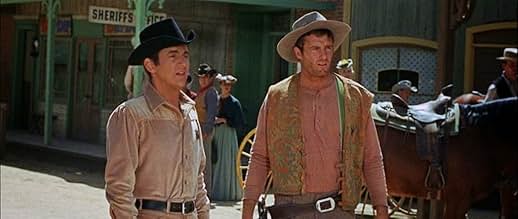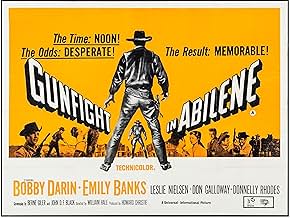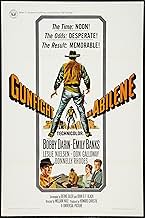IMDb RATING
5.6/10
562
YOUR RATING
A sheriff, haunted by the accidental killing of his best friend, refuses to wear a gun. But when the brother of his best friend is murdered, the lawman must make a choice.A sheriff, haunted by the accidental killing of his best friend, refuses to wear a gun. But when the brother of his best friend is murdered, the lawman must make a choice.A sheriff, haunted by the accidental killing of his best friend, refuses to wear a gun. But when the brother of his best friend is murdered, the lawman must make a choice.
- Director
- Writers
- Stars
- Director
- Writers
- All cast & crew
- Production, box office & more at IMDbPro
Featured reviews
Besides one other Western, Journey to Shiloh' (1968) and the obscure early effort Lonnie' (1963), William Hale has worked principally in TV since the start of his career. This is a shame as from the evidence of Gunfight in Abeline' at least, he is able to work comfortably in a major genre with none of the small screen inhibitions which seems to affect directors who cross over.
The present film was received indifferently by critics upon its first appearance and it is hard to see why. While no masterpiece, it is a solid, engaging piece of work, offering Darin one of his finest and most dramatic roles. When one remembers the dull screen impression made by his nearest equivalent in Westerns, that of Audie Murphy (another actor who died relatively young), Darin's considerably more interesting screen persona seems to have been badly wasted. Add to his acting abilities as a vocalist and songwriter - as evidenced by the memorable ballad Amy' over which the credits of this film play out Darin's versatility is very interesting. In fact he was briefly marketed by the ever hopeful studio as the "new Sinatra".
In Abeline' Darin plays Cal Wayne, a man haunted by two accidents: that of the injury of Grant Evers' arm when they where children, and of the death of Evers' brother during a skirmish during the Civil War. Evers' arm is a constant reminder of Wayne's incipient guilt, as well as suggesting the cattle magnate's unfeeling morality. But Evers is no simple black hearted villain. He has behaved with perfect honour towards his intended bride Amy and, although a ruthless businessman, initially at least strives to avoid confrontation and violence with the farming lobby. Far more reprehensible is his henchman Jack Slade, and the mutual distaste between the two is always evident. (The difference is particularly noteworthy when Slade upbraids Evers for his weakness in paying compensation to the farmers for his early trespassing and crop destruction.) Even Evers' final act of violence towards Wayne is one generated through impulsiveness, as the now-sherriff confesses how he killed his employer's brother.
Abeline' builds a compact and satisfying Western drama, albeit small-scale, around the Wayne-Amy-Evers-Slade relationships, and Hale's widescreen compositions, his dollying and tracking are very effective without drawing attention to themselves. Most noticeable is the final showdown. Here he employs some off-centred camera angles to frame the boastful Slade, while the montage of facial shots accompanying the ultimate draw anticipates some of the flamboyance of Leone.
This is a film which is entirely successful in its own rewarding and modest terms, and only fails being memorable by an absence of more colourful supporting actors. Neilsen too (acting straight here, long before the days of 'Airplane!')lacks a certain charisma and some of the film comes across as being slightly glum. If Hale had been able to add a Brennan or a Devine into the mix, them the results could have been marvellous. Instead we have a Western drama well worth seeking out, as a traditional, effective genre outing.
The present film was received indifferently by critics upon its first appearance and it is hard to see why. While no masterpiece, it is a solid, engaging piece of work, offering Darin one of his finest and most dramatic roles. When one remembers the dull screen impression made by his nearest equivalent in Westerns, that of Audie Murphy (another actor who died relatively young), Darin's considerably more interesting screen persona seems to have been badly wasted. Add to his acting abilities as a vocalist and songwriter - as evidenced by the memorable ballad Amy' over which the credits of this film play out Darin's versatility is very interesting. In fact he was briefly marketed by the ever hopeful studio as the "new Sinatra".
In Abeline' Darin plays Cal Wayne, a man haunted by two accidents: that of the injury of Grant Evers' arm when they where children, and of the death of Evers' brother during a skirmish during the Civil War. Evers' arm is a constant reminder of Wayne's incipient guilt, as well as suggesting the cattle magnate's unfeeling morality. But Evers is no simple black hearted villain. He has behaved with perfect honour towards his intended bride Amy and, although a ruthless businessman, initially at least strives to avoid confrontation and violence with the farming lobby. Far more reprehensible is his henchman Jack Slade, and the mutual distaste between the two is always evident. (The difference is particularly noteworthy when Slade upbraids Evers for his weakness in paying compensation to the farmers for his early trespassing and crop destruction.) Even Evers' final act of violence towards Wayne is one generated through impulsiveness, as the now-sherriff confesses how he killed his employer's brother.
Abeline' builds a compact and satisfying Western drama, albeit small-scale, around the Wayne-Amy-Evers-Slade relationships, and Hale's widescreen compositions, his dollying and tracking are very effective without drawing attention to themselves. Most noticeable is the final showdown. Here he employs some off-centred camera angles to frame the boastful Slade, while the montage of facial shots accompanying the ultimate draw anticipates some of the flamboyance of Leone.
This is a film which is entirely successful in its own rewarding and modest terms, and only fails being memorable by an absence of more colourful supporting actors. Neilsen too (acting straight here, long before the days of 'Airplane!')lacks a certain charisma and some of the film comes across as being slightly glum. If Hale had been able to add a Brennan or a Devine into the mix, them the results could have been marvellous. Instead we have a Western drama well worth seeking out, as a traditional, effective genre outing.
Though only 11 years had elapsed since the release of "Showdown at Abilene," Universal re-made this under the title "Gunfight in Abilene" with, surprisingly, Bobby Darin taking over the Jock Mahoney role. It's an unexpected casting which does not pay off since Darin seems out of place in a western and he's simply too small and modest to be the kind of tough lawman who could "clean up" a frontier town. In some scenes, he looks even shorter than leading lady, Emily Banks, and whereas Mahoney appeared on the balcony of the Abilene hotel gloriously bare-chested -- showing off his impressive physique but wearing his pants high enough to hide his navel -- Darin plays this same scene with his shirt on though open a bit at the top. (When Darin wakes up from a nightmare in a brief and dimly-lit scene, however, he's bare-chested whereas Mahoney, in a comparable scene, wears an undershirt.) On the plus side, Darin did contribute a song, "Amy," which is sung under the opening credits and which, though undistinguished, is pleasant enough and which today -- due to a decline in movie-song-writing quality -- might win an Oscar.
The triangular relationship among Jock Mahoney, Lyle Bettger, and Martha Hyer which strengthened the original movie is still of interest here but one can't quite believe that Bobby Darin and Leslie Nielsen had once been close friends.
Though this re-make follows the original quite closely, there are two notable changes. This version begins with a Civil War battle sequence showing Bobby Darin accidentally shooting a friend. Thus the audience knows from the start why the guilt-stricken Darin is reluctant to carry a gun when he returns to Abilene and why he feels he owes a debt to the dead friend's brother. When Darin later confesses the truth to Nielsen, his remarks lack the impact they had in the original version when the audience did NOT know what had happened back in the Civil War battle.
The other change is also questionable. In the new version there's a young blonde woman in Abilene who has a crush on Darin and who pops up in a few scenes. This character does not appear in the original version and she adds nothing to the story.
The re-make is superior to the original in two respects, however. Donnelly Rhodes makes a much more convincing "bad guy" than Ted de Corsia, and Michael Sarrazin's whipping is more effectively staged than Grant Williams' whipping in the 1956 version. Sarrazin is stripped of his shirt and subjected to more punishment and taunts than Williams who, for some inexplicable reason, is allowed to keep his shirt on while being flogged, even though he has a pleasing physique -- as was proved in "The Incredible Shrinking Man" -- and even though Universal had begun to groom him for his "hunk" appeal.
Finally, all the character names from the 1956 version have been changed for the 1967 one.
The triangular relationship among Jock Mahoney, Lyle Bettger, and Martha Hyer which strengthened the original movie is still of interest here but one can't quite believe that Bobby Darin and Leslie Nielsen had once been close friends.
Though this re-make follows the original quite closely, there are two notable changes. This version begins with a Civil War battle sequence showing Bobby Darin accidentally shooting a friend. Thus the audience knows from the start why the guilt-stricken Darin is reluctant to carry a gun when he returns to Abilene and why he feels he owes a debt to the dead friend's brother. When Darin later confesses the truth to Nielsen, his remarks lack the impact they had in the original version when the audience did NOT know what had happened back in the Civil War battle.
The other change is also questionable. In the new version there's a young blonde woman in Abilene who has a crush on Darin and who pops up in a few scenes. This character does not appear in the original version and she adds nothing to the story.
The re-make is superior to the original in two respects, however. Donnelly Rhodes makes a much more convincing "bad guy" than Ted de Corsia, and Michael Sarrazin's whipping is more effectively staged than Grant Williams' whipping in the 1956 version. Sarrazin is stripped of his shirt and subjected to more punishment and taunts than Williams who, for some inexplicable reason, is allowed to keep his shirt on while being flogged, even though he has a pleasing physique -- as was proved in "The Incredible Shrinking Man" -- and even though Universal had begun to groom him for his "hunk" appeal.
Finally, all the character names from the 1956 version have been changed for the 1967 one.
Cal Wayne (Bobby Darin) returns home from the Civil War a broken man, haunted and afraid to strap on a gun because he had mistakenly killed his friend. Upon return, he finds that his dead friend's brother, Grant Evers (Leslie Nielsen) has taken over the town with the help of a bullying sheriff, and is engaged to marry the woman Cal loves. With a supporting role by Michael Sarrazin in his big screen debut as a kind-hearted rancher who is flogged by the evil sheriff while returning a stray calf, and eventually dies from the beating (triggering the violent series of confrontations that ends the movie).
The plot of this movie, while following a tried and true formula, does introduce some interesting twists and turns. However, Bobby Darin was a poor fit for the role. One inescapably concludes that Universal was trying him out in the western lead role, and he obviously failed as it was his only western.
Darin's acting seemed forced, his scrawny frame swaggering around with an exaggerated chest-out, shoulders-back posture. His fight scenes with larger men were so forced and obviously scripted that they come off as feeble. His acting was a series of attempts to over-emphasize every word with uncomfortable pregnant pauses while we study his face in close-up. It's all rather bizarre. Even more bizarrely, he wears black leather gloves throughout the entire movie, and appears uncomfortable doing so, constantly tugging at them. Perhaps they were hiding small hands. Who knows, but they stuck out like a sore thumb (no pun intended). He clearly did not belong in this role. Watching him in this movie felt more like watching a low-grade soap opera.
But along comes Leslie Nielsen with another brilliant performance to save the day (barely). Leslie's acting, as always, is smooth and professional and realistic. He plays someone who sits atop an empire with an evil sheriff supporting his power play, emanating barely perceptible evilness. But he also plays a good guy who helps Darin's return to his hometown by giving him back his old job as sheriff, and he doesn't try to force himself on Darin's former girlfriend even though he is engaged to marry her. At one point he even offers to postpone the wedding because he knows he doesn't have her heart. This is one of the interesting plot twists, that Nielsen's character generously offers to give up the girl because he knows she is really in love with Darin's character.
But even Nielsen's film-saving performance and Michael Sarrazin's supporting and sympathetic role in his first appearance on the big screen aren't enough to salvage Bobby Darin's attempt at a leading western man. At times he appears to be trying to emulate Dean Martin in appearance and manner, but fails miserably. Barely made a 6-star rating in my book, and only because of Nielsen and Sarrazin.
The plot of this movie, while following a tried and true formula, does introduce some interesting twists and turns. However, Bobby Darin was a poor fit for the role. One inescapably concludes that Universal was trying him out in the western lead role, and he obviously failed as it was his only western.
Darin's acting seemed forced, his scrawny frame swaggering around with an exaggerated chest-out, shoulders-back posture. His fight scenes with larger men were so forced and obviously scripted that they come off as feeble. His acting was a series of attempts to over-emphasize every word with uncomfortable pregnant pauses while we study his face in close-up. It's all rather bizarre. Even more bizarrely, he wears black leather gloves throughout the entire movie, and appears uncomfortable doing so, constantly tugging at them. Perhaps they were hiding small hands. Who knows, but they stuck out like a sore thumb (no pun intended). He clearly did not belong in this role. Watching him in this movie felt more like watching a low-grade soap opera.
But along comes Leslie Nielsen with another brilliant performance to save the day (barely). Leslie's acting, as always, is smooth and professional and realistic. He plays someone who sits atop an empire with an evil sheriff supporting his power play, emanating barely perceptible evilness. But he also plays a good guy who helps Darin's return to his hometown by giving him back his old job as sheriff, and he doesn't try to force himself on Darin's former girlfriend even though he is engaged to marry her. At one point he even offers to postpone the wedding because he knows he doesn't have her heart. This is one of the interesting plot twists, that Nielsen's character generously offers to give up the girl because he knows she is really in love with Darin's character.
But even Nielsen's film-saving performance and Michael Sarrazin's supporting and sympathetic role in his first appearance on the big screen aren't enough to salvage Bobby Darin's attempt at a leading western man. At times he appears to be trying to emulate Dean Martin in appearance and manner, but fails miserably. Barely made a 6-star rating in my book, and only because of Nielsen and Sarrazin.
This is a good western film from the mid- 60's with Bobby Darin playing a Civil War soldier who returns home, only to find that things have changed in his occupation status, and love life. Darin gives a good performance, and Leslie Nielson is good as the villain.*** stars
Although this is routine faire, it is interesting to watch Darin and Neilson in a western with an early performance by Michael Sarrazin. The title song "Amy" is nifty, worked into the background music nicely and doesn't wear out it's welcome, as in the case of so many other westerns. The plot is routine, but the action moves the story along to it's predictable conclusion nicely, giving us a good watch.
Did you know
- TriviaThe battle scene in the beginning of the film is footage from the 1965 movie, Shenandoah.
- GoofsThe clothing worn by the characters in the film resembles modern Western wear more so than post- Civil War dress. This includes pants with belt loops and shirts with buttons down their entire fronts. Bobby Darin's cowboy hat was the style worn with suits in the 1950s.
- ConnectionsReferenced in Frissons garantis (1968)
Details
- Release date
- Country of origin
- Language
- Also known as
- Justicia en Abilene
- Filming locations
- Production company
- See more company credits at IMDbPro
- Runtime
- 1h 26m(86 min)
- Aspect ratio
- 2.35 : 1
Contribute to this page
Suggest an edit or add missing content






























